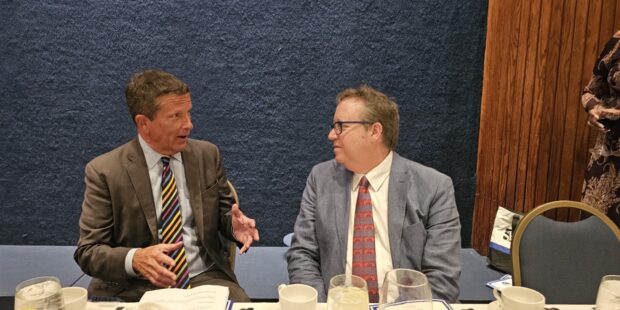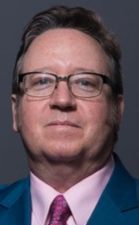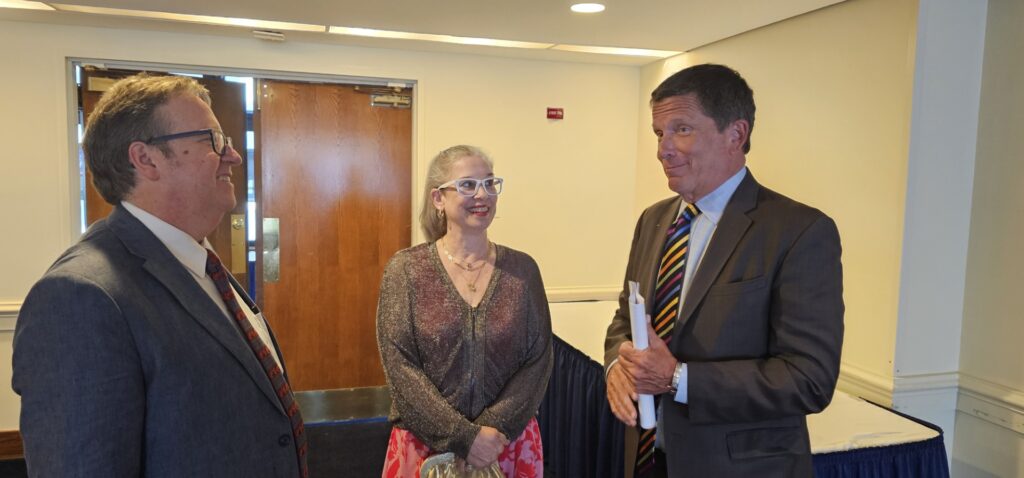
Mark Segraves of News4 Washington, master of ceremonies for the SPJ DC Pro Chapter’s annual Dateline Awards and Hall of Fame dinner on June 11, 2024, in the National Press Club Ballroom, chats with Hall of Fame inductee John Kelly, recently retired from the Washington Post, at the head table before the ceremonies begin. Photo by Randy Showstack
Among the three journalists of distinction that were inducted into the Society of Professional Journalists Washington, D.C., Professional Chapter’s Washington Journalism Hall of Fame June 11, 2024, at the chapter’s annual Dateline Awards and Hall of Fame dinner was John Kelly, veteran journalist with at least 25 years practicing strong journalism in Washington.
Kelly, the former Washington Post columnist, now retired, known for his look at Washington’s less-famous side, started at The Post in 1989. In his nearly 20 years as author of “John Kelly’s Washington” he estimates he wrote rough 4,600 columns, some of them about squirrels. Born in Washington, Kelly’s first job at the Post was deputy editor in the Weekend section. He later edited Weekend, founded KidsPost, and was a general assignment reporter in the Metro section. There, he says, he wrote “mainly feature stories about such things as weather, bomb-sniffing dogs, Girl Scout cookies and adulterous lawyers.”

“To paraphrase Russell Baker, journalism had always ‘attracted people whose minds were open and interesting, people who were curious instead of preachy, people who distrusted people who had all the answers.’
I’m biased, but I think the world still needs people like that, people like you.” — John Kelly
Harvard and Oxford awarded him journalism fellowships. A rock-and-roll drummer, Kelly is two-time winner of “Journopalooza” Battle of the Bands.
Kelly was introduced by Mark Segraves, general assignment reporter at News4 Washington, who was pulling double duty on the evening by also conducting the festivities as master of ceremonies.
Following are excerpts from Kelly’s prepared acceptance remarks:
“Thank you, Mark Segraves, for that introduction. I had asked to be introduced by Neal Augenstein, but he was busy tonight.
“My first job after college was in the publications department of an association of people who ran associations in Washington. It was called the Greater Washington Society of Association Executives. As much as I enjoyed my time at ol’ GWSAE, after about three years I longed to work somewhere else.
“I didn’t know what I wanted to do, exactly, but I knew I wanted to work at a place where smart, funny people talked bullshit all day long. That, to me, sounded like heaven. And that is what the best newsroom is: a bunch of smart, funny people talking bullshit to one another all day long, stopping only to file their stories, upload their photos, tape their broadcasts, or deliver traffic and weather on the 8s.
“I confess that it wasn’t a burning desire to make the world a better place that got me into journalism. It was selfishness. I wanted to entertain myself. If I accidentally entertained a few readers along the way, so much the better.
“Unlike the other honorees here tonight, I was never a serious journalist. I worry I’m not a serious person. In fact, I’m a rather shy person. And I’m naturally lazy. There is nothing better for a shy, lazy person than having to write a daily column. Like the prospect of being hanged in a fortnight, it tends to concentrate the mind wonderfully.
“Readers would sometimes ask: ‘How do you do it? How do you come up with so many ideas, write so many columns?’ I told them my secret: Not all the columns had to be that good. If I had two decent columns out of five, that’s still a .400 average. And if you bat .400 in the major leagues you get in the Hall of Fame.
“I liked writing about history in my column, especially local history. I hope you’ll tolerate a little journalism history tonight. A few years ago I picked up a book called Lessons From the Past: Journalists’ Lives and Work, 1850-1950. It’s by a University of Central Florida communications professor named Fred Fedler.
“The book is a deep dive into a time before TV, before the internet, before CraigsList and YouTube, before search engine optimization and social media. The Good Old Days, you might call them, if you ignored the sexism and racism. What was it like to be a reporter or editor back then? Well, there’s an entire chapter called ‘Were Journalists Heavy Drinkers?’ (Spoiler alert: Many were.)
“There’s an entire chapter on how journalists got fired, too. Making errors was a main reason, of course. But there was also bad writing, laziness, dishonesty, drunkenness, ignorance, and incompetence. Frank Munsey, a publisher who owned papers in Washington, New York and Boston, believed that ‘a fat man spoiled the appearance of an office.’ He was known for walking through the newsroom and sacking anyone he thought was too heavy.
“Journalism was a suspect career back then. The Society of Professional Journalists may have been founded in 1909, but journalism was seen not as a profession but [rather] as a vocation, a trade. In his memoir, New York Times columnist Russell Baker wrote that most respectable people thought journalism work was for “life’s losers.” Newspaper folk, he wrote, ‘were thought to be a vagabond crowd addicted to booze, vulgar language, bad manners, smelly wardrobes, heavy debt, and low company.’
“That certainly doesn’t describe anyone in this room – I sniffed Segraves earlier and he smelled lovely, like sandlewood and persimmon. And it probably didn’t apply to most journalists back then. To paraphrase Russell Baker, journalism had always ‘attracted people whose minds were open and interesting, people who were curious instead of preachy, people who distrusted people who had all the answers.’
“I’m biased, but I think the world still needs people like that, people like you.
I liked writing about history in my column, especially local history. I hope you’ll tolerate a little journalism history tonight.
John Kelly
“I would like to thank the Society of Professional Journalists for this honor, which was entirely unexpected. I want to thank my Post colleagues, who I’m delighted to see here tonight – and congratulations on your awards and your nominations. I want to thank Ruth, who I referred to as My Lovely Wife in my column. Some people thought I was being ironic or snarky when I called her that. I wasn’t. I was being descriptive.
“I want to mention one other book about journalism: The Paper, by Richard Kluger. It’s about the New York Herald Tribune. The book clocks in at around 800 pages. Two of those pages are about a Herald Tribune writer named Robert B. Peck who joined the paper in 1912. He was a rewrite man, which means he never left the office. He sat at his desk taking feeds over the telephone from so-called legmen and then turned those scraps into sparkling prose.
“I worked at the Post for 34 years. Peck worked at the Tribune for 43 years. By the time Peck retired to the Catskills, it was estimated he had written 40 million words for the Tribune. Admiring colleagues asked him whether now, finally, he would write books or articles of his own choice.
“No, said Peck, ‘I have written.’
“I hope that I’m not done writing. Still, I can’t think of a better three-word summation of a long career in journalism – a long, beloved career – than ‘I have written.’
“Thank you.”

John Kelly, retired columnist for The Washington Post, before his induction into the Society of Professional Journalists Washington, D.C., Pro Chapter’s Washington Journalism Hall of Fame, chats with his wife Ruth Pritchard-Kelly and Mark Segraves (right) of News4 Washington, who will introduce him later as he is inducted during ceremonies for the SPJ DC Pro Chapter’s annual Dateline Awards and Hall of Fame dinner on June 11, 2024, in the National Press Club Ballroom. Photo by Randy Showstack
